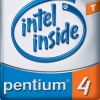K in Intel CPUs - a question
What are the benefits in gaming that come from overclocking CPUs?
In a CPU-limited game, you will get better performance in accordance with a higher clock speed. In most games (i.e. which are GPU-limited) there will be little or no difference.
Here's the technical answer to the original question:
An i5-4460 has a base clock (BCLK) of 100 MHz, and a clock speed multiplier of 34. It derives it's frequency from 100 MHz * 34 = 3400 MHz.
In any case (K-series CPU or not) you can change the BCLK. But as described in a couple of posts that's inadvisable on a Haswell CPU because the BCLK is coupled to several other bus frequencies on the board. You'll see instabilities rather quickly. The 'K' indicates a CPU where the multiplier (the 34) can be changed. That only directly affects the CPU frequency, and so it's a lot easier to get a good, high overclock from it.
i also heard overclocking pcie lanes is bad but... why?
Because the PCIe bus has relatively low tolerance for running out of spec, and therefore it will cause instability quite quickly. You might get the BCLK up to about 105 MHz or so before you start seeing crashes.














Create an account or sign in to comment
You need to be a member in order to leave a comment
Create an account
Sign up for a new account in our community. It's easy!
Register a new accountSign in
Already have an account? Sign in here.
Sign In Now